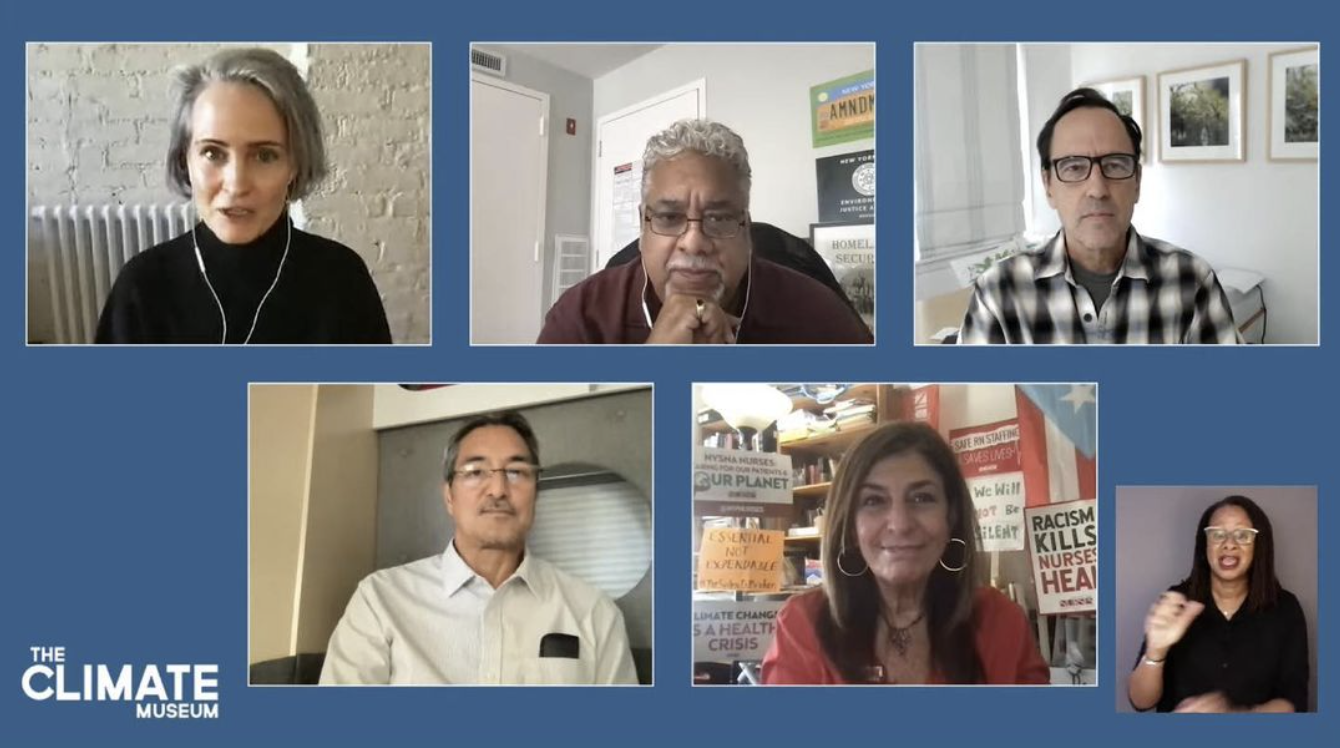A year of Talking Climate!
By Dilshanie Perera
We have been thrilled to present the Talking Climate series this year at the Climate Museum. These conversations, led by our Director Miranda Massie, show the inextricability of the climate crisis and structures of inequality in shaping our contemporary world and the necessity of understanding both together in order to tackle the most pressing challenges that we face today.
Panelists in Talking Climate: Labor
The discussion series brought together expert panelists from a variety of backgrounds who are doing work at the frontlines of these twinned crises. They are leaders in the fields of activism, community organizing, journalism, research, policy, science, and more. Their incisive insights and the generosity of their engagement with one another created the space for a deep exploration of themes at the intersection of climate and inequality, which have included: Displacements, Grief, Infrastructure, Identity, Food, Law, Health, and Labor.
Looking back at the range and depth of these conversations, a through line emerges. Audiences explored how climate and inequality inflect every aspect of life – from the food we eat, the health of our bodies and communities, and the work we do, to the legal system that structures possibilities of protest and redress, and the infrastructures that shape our built environment. A focus on past, present, and future provided new ways of thinking about how we’ve gotten to this point, the actions people have been taking to bring about change, and the directions we need to move in together to facilitate lasting transformation. For those who have missed any conversations in the series, videos, event descriptions, and the list of our panelists and their affiliations can be found here.
Each event ended with a call to action made to audience members: to contact their elected representatives and to make their voices heard on climate-forward legislation that matters to them. In this time of uncertainty and grave political delay at the federal level, taking action by building community and developing practices of civic engagement are the antidotes to despair.
I’ve written elsewhere that Talking Climate shows “how climate exacerbates and transforms historical and contemporary inequalities and dispossessions, making climate something that is not the domain of a singular science, but something we must trace and understand through society, culture, politics, economics, and history. By bringing together interdisciplinary experts in conversation, the Talking Climate series offers a blueprint for analyzing multiple crises together at the same time. This suggests a pathway forward for climate action: that without centering inequality, robust policy will be, at best, incomplete. And this also suggests an avenue for public advocacy: that the twinned crises of climate and inequality are not separable issues, and that real solutions will necessitate a comprehensive approach to their entanglement.
We’ve seen new and lasting friendships emerge through the series. When we launched Talking Climate in January with Talking Climate: Displacements, we were amazed to see participants tuning in from across the U.S. and from countries on every inhabited continent around the world. We’ve been grateful for your comments and questions in the live chat and your feedback on what resonated most with you. We have been able to connect with so many of you through the series, which we will continue quarterly in 2022. If you would like to send us your thoughts on the discussion events or to suggest topics you would like to see next year, you can take the survey linked here.
Panelists in Talking Climate: Food
I invite you to share the Talking Climate series with others. We see these discussions as the entry point for getting deeper into topics that spark your curiosity, and to be the catalyst for conversations with the people in your life who would be interested in hearing your thoughts on these important themes.
We at the Climate Museum are excited to continue these conversations with you in the new year. In a time of collective struggle, it has been consistently galvanizing to learn about the work that practitioners from various fields are already doing in this area. As our panelists’ work shows, substantive victories against oil pipeline construction, against environmental racism, and against state neglect and dispossession are already being achieved. As activists and organizers emphasize, constant political pressure and advocacy are necessary to bring about systemic change. Our goal is to support you however we can on your pathway toward collective climate action and community building. Together, we can build a culture for climate action and bring a justice-centered future into being.
Dilshanie Perera
Andrew W. Mellon Foundation Post-Doctoral Fellow in Climate and Inequality




